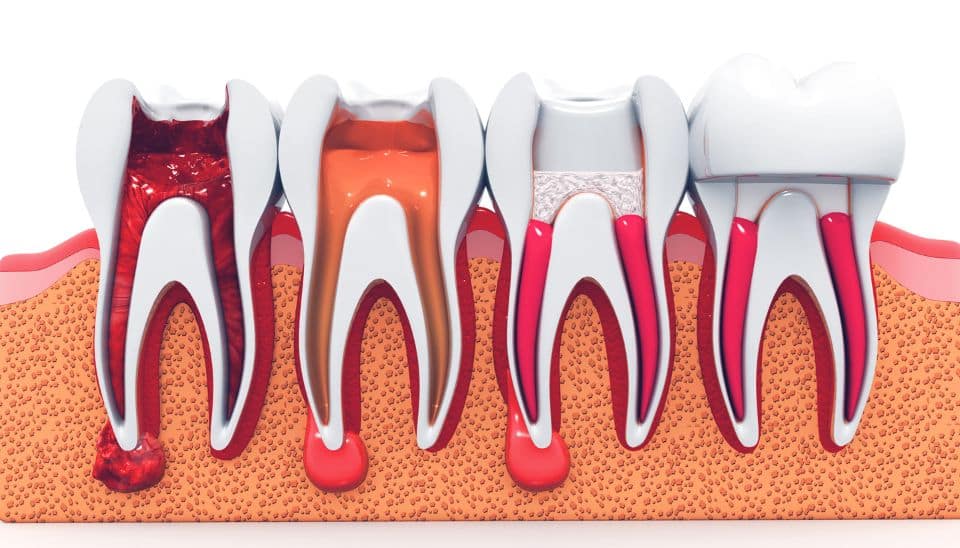Root Canal Treatment
We have years of experience delivering root canal treatments in Hamilton. It's a procedure that has carried much anxiety for patients in the past but developments in technology and improved techniques have allowed us to deliver a much more comfortable experience.
The root canal itself is a fine space inside the tooth that contains the dental pulp that consists of soft tissue of nerve and blood vessels. If the dental pulp becomes diseased and badly decayed (or dies), a toothache or an abscess may occur. In the past, treatment would involve having the tooth extracted, but now a root canal procedure can save the tooth from being pulled.
What are the symptoms of a root canal?
Your dentist or endodontist will be the only ones that will be able to properly diagnose whether a root canal is required. Some of the common symptoms however include:
- Pain/sensitivity to hot/cold temperatures
- Severe pain during eating
- Abscesses may form on the gum that won't go away
- Possible discolouration in the tooth
- Uncomfortable swelling around the tooth.
What happens if a root canal goes untreated?
If you start to experience the symptoms above it’s important to make an appointment with your dentist as soon as possible. In most cases, the pain you’ll be experiencing will compel you to do so.
If left untreated the infection will most likely continue to spread in the mouth and surrounding area. This could lead to surrounding teeth becoming inflamed and infected which could lead to the loss of those teeth and, in the worst-case scenario, infection around the head and neck could also occur.
Are root canals common?
If you have been told that you require root canal treatment, you are not alone. Millions of teeth every year are saved using root canal treatment and a root canal no longer means you will lose a tooth.

What's involved in a root canal procedure?
The procedure is also known as endodontic treatment and follows a fairly standard step-by-step process. This includes:
- Taking an x-ray to confirm the shape of the root canals and identify where the infection is
- The cleaning out of the inside of the tooth which includes having the infected pulp removed
- The sealing of the tooth usually with a temporary filling in the first instance
- The filling and final sealing once the dentist is satisfied the infection has cleared.
Root canals can lead to deep decay and abscesses forming if not treated so it is important to book in with your dentist if you detect any of the signals listed above.
How successful are root canal treatments?
If the canals are able to be fully cleaned and sealed and the tooth properly restored, then treatment has a very high success rate. The treatment may take several visits to complete with temporary fillings and dressings placed in the tooth between visits.
Antibiotics are sometimes prescribed when an infection is present. The end result is the repair and saving of your natural tooth ridding it of pain and/or infection. This will give you full functionality with your tooth.
How is a tooth restored following root canal treatment?
It is very important that any dental restoration adequately seals the root filling from infection by bacteria in the mouth. Teeth requiring treatment often have large fillings or extensive damage and will require a crown to restore them properly. These teeth are also weaker and become brittle and the added protection of a crown is recommended.
What complications can occur during root canal treatment?
Because the root canals are very fine and curved in some teeth, it may be difficult to clean the canals completely. Occasionally a piece of a file may break off inside due to the strain placed on these fine instruments. Sometimes these are retrievable, but they may also be sealed in the tooth as part of the filling. Pain or discomfort may occur between appointments due to ongoing tenderness of the tissues around the tooth, or a flare-up of an abscess or a hair-line crack in the root.
Is root canal treatment painful?
Endodontic procedures have come a long way in recent times with the improvement in technology, development of modern painkillers and skilled specialists. Local anaesthetic and modern painkillers are used to provide comfortable treatment. Usually painful symptoms improve once treatment is started.
How much does a root canal cost in NZ?
The cost varies and our dentist will give you an estimate after a thorough examination. The cost will depend on the difficulty and the time spent treating the tooth during dental work.

Root Canal FAQs
Related blog posts
Want to find out more?
Request an appointment or drop us a line today.
You Might Also Be Interested In
Site map
Services
Contact Us
T: 07 854 8905
E: info@thehdc.co.nz
3/111 Thomas Road,
Rototuna, Hamilton
copyright © 2025 Hamilton Dental Centre | Credit Terms | Web development by Digital Hothouse


